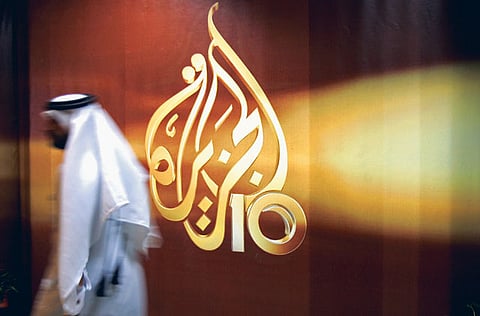Al Jazeera’s role raises questions
It is important we remind ourselves daily of the golden rule of journalism

The recent incident, which saw the expulsion of Al Jazeera correspondents by other journalists who booed them at a conference of the Egyptian armed forces, violates the professional ethics of the job — even if it was expected. Unfortunately, that act came from journalists towards their colleagues amid strong criticism that the channel is biased in its coverage of the events in Egypt.
Whatever our point of view regarding the channel’s policies, that act is just a side show for the deterioration of professional practices in Arab media. But here, Al Jazeera TV channel has a big share of responsibility in this deterioration.
A lot has been said about the channel since it was launched in 1996, but the Arab audience, thirsty for freedom of expression and speech, could not stop for a minute to evaluate and verify the channel’s professional standards under the temptation a new type of media, which represents for them a breathing space for expression.
Among those Arabs, a great number of Arab intellectuals condoned professional criticism of the channel, preferring to deal with Al Jazeera as a unique platform of its kind for opinion and political propaganda. An easy question needed an answer: Why did the channel have wide regional — with biting criticism — coverage while ignoring some major events in Qatar itself? That question faded away in the midst of eagerness towards a new taste and type of freedom of expression. But is this true? I mean, to what extent can we judge any practice of freedom of expression away from the professional standards?
In another words, can we consider any criticism of a government or public figure as a practice of freedom of expression? Many, including myself, will say yes in general, but when you do it selectively, doubts will rise around you, Al Jazeera was not far from such doubts all these years.
The deterioration of professional standards in Arab media did not occur suddenly, following the Arab Spring and the rise of sectarianism. Unfortunately, this was happening over the last few decades as the number of TV stations and talk shows grew. Arabs gained western-style TV channels, but the content barely reached their professional standards.
For 30 years in this career, we were reminding ourselves daily of the golden rule in journalism: Not to fall in love with a source or take sides, but events proved that this rule was — and still is — in a way an illusion.
Some would argue that there is no neutrality in media — pointing also to some influential western papers or TV stations who display biased reporting when it comes to certain news coverage like Palestine.
This is true, but if that is a bad example, then why do the same or maybe even worse? In the last days before former Egyptian president Hosni Mubarak stepped down in February 2012, the Al Jazeera Live channel was broadcasting old Egyptian patriotic songs along with the scenes of demonstrations in Tahrir Square. How is this justifiable? Was it covering the events or influencing them?
Later on, and when the Muslim Brotherhood took power, the channel gradually reviled a biased coverage for all that was happening in Egypt. But this is not the end of the story.
The deterioration of professional standards has other faces when a senior presenter of Al Jazeera holds the microphone on the platform of a Muslim Brotherhood sit-in in Cairo and acts like a political leader.
Now, many Arab journalists, men and women, practice their right of expression on Twitter and Facebook — be it supporting or condemning events, governments or public figures. But With all respect to freedom of expression, this raises the question again: To what extent can a journalist express his/her opinion thereby taking sides?
During the Arab Media Forum in May, I had asked one of the Egyptian talk show presenters to be objective in his criticism of president Mursi and the Muslim Brotherhood, instead of acting like a political activist.
He replied: “Freedom of expression is in danger”. But my answer was clear: “Then fight your battle in a professional manner and not through political propaganda.”
Nowadays, this young man is under criticism from anti-Muslim Brotherhood and Egyptian human rights NGOs because of what was considered a racist statement in his show towards Syrians and Palestinians who support the Muslim Brotherhood.
Undoubtedly, launching Al Jazeera TV station in 1996 was a fall of a big stone in the stagnant waters in the Arab world. It was a challenge and those who were unhappy with Al Jazeera responded to the challenge by launching their own TV stations.
Political parties and wealthy people, Sunni and Shiite Islamists, launched their own channels. But by all means, that was duplicating Al Jazeera rather than offering something new. The result? Biased coverage and journalists acting like activists. And the losers are “professionalism” and “democracy” which are still out of reach.
Mohammad Fadhel is a Bahraini writer and media consultant based in Dubai.
Sign up for the Daily Briefing
Get the latest news and updates straight to your inbox



